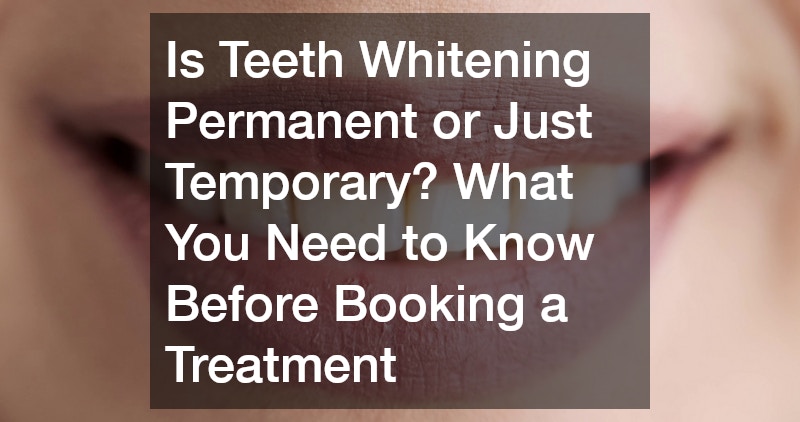
A bright, white smile is often associated with confidence, youth, and good health. It’s no surprise that teeth whitening has become one of the most popular cosmetic dental treatments today. But before you invest time and money into it, there’s an important question you should ask: Is teeth whitening permanent or just temporary? Understanding what to expect can help you make informed decisions and maintain your results for as long as possible.
In this article, we’ll explore the longevity of teeth whitening treatments, the factors that affect their duration, the types of whitening options available, and how to prolong the results. Whether you’re considering in-office whitening, take-home trays, or over-the-counter products, this guide will give you everything you need to know before booking a treatment.
What Does Teeth Whitening Really Do?

Teeth whitening is the process of removing stains and discoloration from the surface of your teeth to make them appear whiter. Most professional treatments use hydrogen peroxide or carbamide peroxide as bleaching agents, which penetrate the enamel and break down colored molecules.
There are different levels of whitening depending on the treatment method. Some only affect surface stains (extrinsic), while others can reach deeper layers (intrinsic discoloration). While whitening can significantly improve the appearance of your teeth, it does not make your teeth immune to future staining.
Key point: Teeth whitening doesn’t change the natural color of your teeth permanently—it simply lightens the existing shade, which can fade over time.
Is Teeth Whitening Permanent or Just Temporary?
Teeth whitening is not permanent. Its effects fade over time due to a combination of natural enamel aging, dietary habits, and oral hygiene practices. How long the results last depends on the method used and how well you care for your teeth afterward.
Here’s a breakdown of typical whitening longevity:
- In-office professional whitening: Lasts 1–3 years with proper care.
- At-home trays (from a dentist): Last 6–12 months on average.
- Over-the-counter whitening strips or toothpaste: Results may last a few weeks to a couple of months.
Keep in mind that lifestyle choices, such as drinking coffee, tea, red wine, or smoking, can cause discoloration to return more quickly. Even natural enamel wear can affect how white your teeth appear over time.
Related keyword: If you’re asking, “How long does teeth whitening last?”, the answer will vary depending on the product you use and how well you maintain your oral health.
What Factors Affect How Long Teeth Whitening Lasts?
The longevity of your whitening results can be influenced by several key factors. Understanding these can help you take control of your smile and extend the benefits of your treatment.
- Diet and Lifestyle Habits
- Coffee, tea, wine, berries, and soy sauce are known to stain teeth.
- Smoking and tobacco use accelerate discoloration.
- Oral Hygiene
- Brushing twice a day and flossing daily can help preserve your whitened teeth.
- Regular dental cleanings remove plaque buildup and stains.
- Type of Whitening Treatment
- Professional treatments tend to last longer and provide more even results.
- Tooth Porosity
- Some people naturally have more porous enamel, which can absorb stains more easily.
- Aging and Genetics
- As enamel thins with age, the yellowish dentin underneath becomes more visible.
How to Prolong Teeth Whitening Results
Just because whitening isn’t permanent doesn’t mean you can’t enjoy your results for a long time. With the right strategies, you can significantly extend the effects of your treatment.
- Use a Straw: When drinking dark liquids, using a straw can reduce contact with your front teeth.
- Rinse After Meals: Swish water around your mouth after eating or drinking stain-causing foods.
- Whitening Toothpaste: Use a non-abrasive whitening toothpaste a few times a week to help maintain brightness.
- Touch-Up Treatments: Talk to your dentist about safe, occasional touch-ups with at-home trays or strips.
- Regular Cleanings: Visit your dentist for cleanings every 6 months to prevent buildup and surface stains.
Pro tip: Maintain a “white diet” for the first 48 hours after professional whitening—avoid anything that would stain a white shirt.
Which Whitening Option is Best for You?

Not all whitening methods are created equal, and the right one for you depends on your goals, budget, and dental condition. Here’s a quick comparison:
| Whitening Method | Pros | Cons | Duration |
| In-office (Laser or LED) | Fast, noticeable results | Costly, may cause sensitivity | Up to 3 years |
| At-home trays (from the dentist) | Custom fit, effective | Slower results; requires discipline | 6–12 months |
| Over-the-counter strips | Affordable, easy to use | Uneven whitening, less potent | 1–2 months |
| Whitening toothpaste | Inexpensive, daily use | Only removes surface stains | Ongoing use needed |
Before starting any whitening regimen, consult with your dentist to check for cavities, enamel erosion, or gum issues that could be worsened by bleaching agents.
Are There Any Risks or Side Effects?
While most whitening treatments are safe when used correctly, they can cause side effects in some cases, especially with overuse or misuse.
Common side effects include:
- Tooth Sensitivity: Temporary discomfort due to peroxide penetration.
- Gum Irritation: Caused by contact with bleaching agents.
- Enamel Damage: With excessive use or highly abrasive products.
These risks are generally avoidable by using products as directed and under professional supervision.
Final Thoughts: Should You Go for It?
So, is teeth whitening permanent or just temporary? The truth is, it’s temporary—but with the right maintenance, you can enjoy a dazzling smile for months or even years. The key is to choose a treatment that fits your needs and to follow up with good habits.
Before booking a teeth whitening session, make sure you understand your options, discuss potential risks with your dentist, and commit to post-treatment care. A bright smile can be an investment—but with the right approach, it’s one that pays off.
